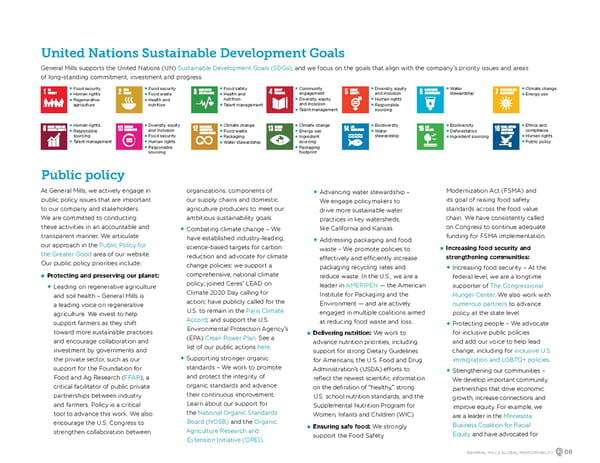At General Mills, we actively engage in public policy issues that are important to our company and stakeholders. We are committed to conducting these activities in an accountable and transparent manner. We articulate our approach in the Public Policy for the Greater Good area of our website. Our public policy priorities include: n Protecting and preserving our planet: w L eading on regenerative agriculture and soil health – General Mills is a leading voice on regenerative agriculture. We invest to help support farmers as they shift toward more sustainable practices and encourage collaboration and investment by governments and the private sector, such as our support for the Foundation for Food and Ag Research ( FFAR ), a critical facilitator of public private partnerships between industry and farmers. Policy is a critical tool to advance this work. We also encourage the U.S. Congress to strengthen collaboration between organizations, components of our supply chains and domestic agriculture producers to meet our ambitious sustainability goals. w C ombating climate change – We have established industry-leading, science-based targets for carbon reduction and advocate for climate change policies: we support a comprehensive, national climate policy; joined Ceres’ LEAD on Climate 2020 Day calling for action; have publicly called for the U.S. to remain in the Paris Climate Accord ; and support the U.S. Environmental Protection Agency’s (EPA) Clean Power Plan . See a list of our public actions here . w Supporting s tronger organic standards – We work to promote and protect the integrity of organic standards and advance their continuous improvement. Learn about our support for the National Organic Standards Board (NOSB) and the Organic Agriculture Research and Extension Initiative (OREI) . w A dvancing water stewardship – We engage policymakers to driv e more sustainable water practices in key watersheds, like California and Kansas. w Addressing packaging and food waste – We promote policies to effectively and efficiently increase p ackaging recycling rates and reduce waste. In the U.S., we are a leader in AME RIPEN — the American Institute for Packaging and the Environment — and are actively engaged in multiple coalitions aimed at red ucing food waste and loss. n Delivering nutrition: We work to advance nutrition priorities, including support for strong Dietary Guidelines for Americans, the U.S. Food and Drug Administration’s (USDA) efforts to reflect the newest scientific information on the definition of “healthy,” strong U.S. school nutrition standards, and the Supplemental Nutrition Program for Women, Infants and Children (WIC). n Ensuring safe food: We strongly support the Food Safety Modernization Act (FSMA) and its goal of raising food safety standards across the food value chain. We have consistently called on Congress to continue adequate funding for FSMA implementation. n Increasing food security and strengthening communities: w Incr easing food security – At the federal level, we are a longtime supporter of The Congressional Hunger Center . We also work with numerous partners to advance policy at the state level. w Pr otecting people – We advocate for inclusive public policies and add our voice to help lead change, including for inclusive U.S. immigration and LGBTQ+ policies . w S trengthening our communities – We develop important community partnerships that drive economic growth, increase connections and improve equity. For example, we are a leader in the Minnesota Business Coalition for Racial Equity and have advocated for Public policy General Mills supports the United Nations (UN) Sustainable Development Goals (SDGs) , and we focus on the goals that align with the company’s priority issues and areas of long-standing commitment, investment and progress. n Food security n Food waste n Health and nutrition n Food safety n Health and nutrition n Talent management n Water stewardship n Climate change n Energy use n Ingredient sourcing n Packaging footprint n Climate change n Food waste n Packaging n Water stewardship n Biodiversity n Deforestation n Ingredient sourcing n Ethics and compliance n Human rights n Public policy n Biodiversity n Water stewardship n Diversity, equity and inclusion n Food security n Human rights n Responsible sourcing n Human rights n Responsible sourcing n Talent management n Climate change n Energy use n Diversity, equity and inclusion n Human rights n Responsible sourcing n Community engagement n Diversity, equity and inclusion n Talent management n Food security n Human rights n Regenerative agriculture United Nations Sustainable Development Goals GENERAL MILLS GLOBAL RESPONSIBILITY 06
 GeneralMills Global Responsibility Report Page 7 Page 9
GeneralMills Global Responsibility Report Page 7 Page 9